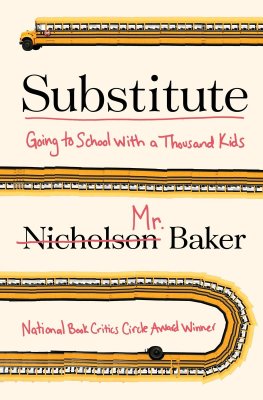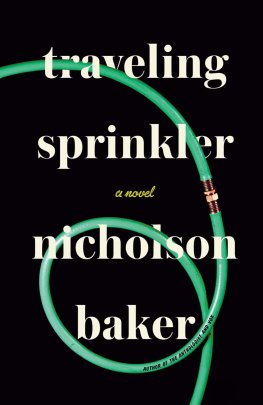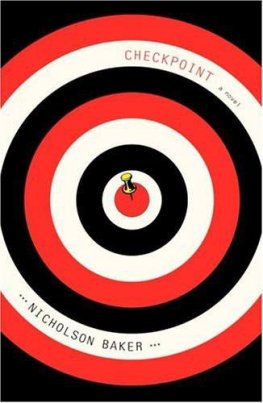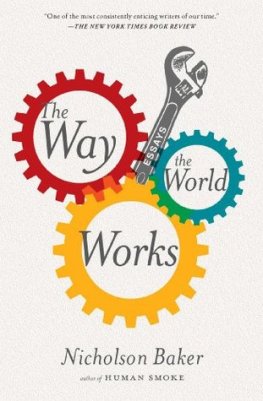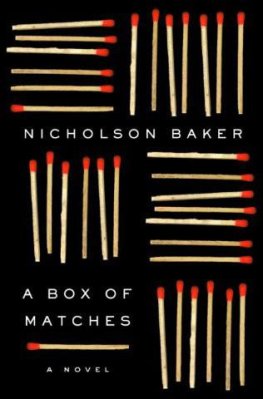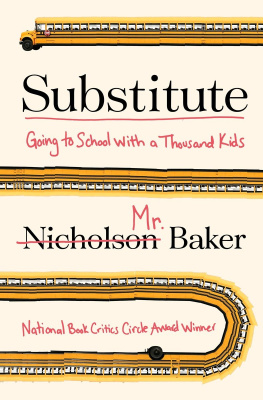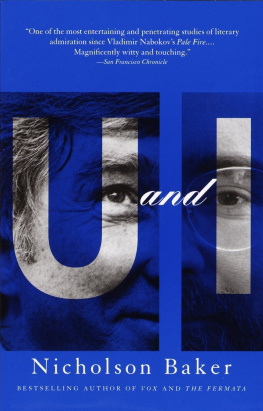Nicholson Baker
Substitute: Going to School With a Thousand Kids
To my wife Margaret, my daughter Alice, and my son Elias
THIS BOOK IS a moment-by-moment account of the twenty-eight days I spent as the lowest-ranking participant in American education: a substitute teacher. I taught all ages, from kindergartners to twelfth-graders, and all required subjects reading, writing, math, social studies, and science plus a few electives here and there, like metal tech. I taught honors students and students in special ed classes about a thousand children in all. I didnt have a teaching certificate, and Id never taught in a primary or secondary school, but that didnt matter all you need is a high school diploma, a clean criminal record, and a willingness to tolerate your own ineptitude.
I sought out the teaching job because I wanted to know what life in classrooms was really like. There are many books of educational advice, of theory, of hagiography, of gloomy prognosis whats missing is a lived-through sense of how busy and complicated and weird and long every school day is; how many ups and downs there are, and how exhausting and sometimes entertaining school is, for students and teachers both. Forget curriculum, forget the parts of speech and the noble gases, the nature of prime numbers and the components of an argumentative essay: for many kids, going to school is simply about finding a way to get through six and a half hours of compulsory deskbound fluorescence without wigging out and incurring punishment. In these pages Ive tried to convey, without exaggeration, the noisy, distracted, crazy-making reality of one fairly typical, not-terribly-poor-but-hardly-rich school district. Im grateful to all the students who put up with my own fumbling attempts at doing my job, and to Sarah Hochman and David Rosenthal, of Blue Rider Press, who gave me the go-ahead to write this book. My wife Margaret, and my children Alice and Elias, to whom I lovingly dedicate this book, helped all the way through.
Before we get started, though, I should probably say something about my own schooling. I went to kindergarten at a private school in Rochester, New York my mother paid for my tuition by painting circular murals of pelicans and polar bears that hung on the wall of the inner courtyard where we had lunch. For first, second, third, and fourth grade, I went to Martin B. Anderson School Number 1 in Rochester, where I had no homework, except once or twice a semester when we had to write a report. Once I saw a boy squash a praying mantis with his sneaker, a horrible sight, and once I saw another boy slammed into a wall by a teacher during a game of dodgeball. In third grade we learned cursive, and the teacher, Mrs. Newcomb, who disliked me because of my Beatles haircut, told me that I was going to injure my eyesight by reading an old edition of Twenty Thousand Leagues Under the Sea, set in tiny type.
In fifth grade, in 1967, I took part in one of the earliest experiments in voluntary integration: I got on a bus and rode, for an hour, from our middle-class neighborhood in Rochester to Clara Barton School Number 2, in what survived of the poor neighborhoods downtown after the bulldozing erasure of urban renewal. Number 2 was a brand-new school, and I was part of a small white minority. The work was not difficult and there was an art class where I made a cast of my hand and threw clay pots and I did practically no homework. I got beaten up once by some older kids, but not badly: that was my only adventure. For seventh grade I went to Number 23 School and was taught by a dashing man who loved basketball. I did nothing in seventh grade except eat Hostess Ho Hos and think about ten-speed bicycles and speed skates. No, not nothing: I completed one five-page report called The Legs and Feet, with diagrams of bones and muscles, when we were assigned to write about transportation in New York State. Eighth grade happened in a special wing of Monroe High School, where the homework was minimal and bathrooms were scary and we had to swim naked in gym class, a hideous experience.
High school was, again, permissive and free of homework and other indications of rigor: I went to a brand-new experimental public school called the School Without Walls, where I played music and took whatever classes I wanted and watched a lot of sitcoms on TV. While at School Without Walls I also audited courses at the University of Rochester two literature classes, a history class, and a music theory class at the Eastman School of Music. I graduated a year early and typed my own transcript. And then I went to college first at the Eastman School, and then at Haverford College, where I learned how to write and worked hard. Thats the entirety of my formal education.
Now for my time as a teacher.
IN JANUARY OF 2014, Regional School Unit 66everyone just called it RSU66offered an adult-education class at Lasswell High School in Lasswell, Maine, about fifty miles from where I live. It met one evening a week for four weeks. The class was called Substitute Teacher Training. I paid the thirty-four-dollar fee and signed up.
We met in a big white room on a frozen Tuesday night in February. There were eight students sitting at circular tables a potter, a former seller of artists supplies, a former nanny, an elementary school teacher recently moved from Boston, a student from the University of New Hampshire, the wife of a firefighter, a recent high school graduate who wore a brown knit cap, and me. Our teacher, Shelly, passed out a packet of information and said she was going to help us build tools and strategies for our substitute-teaching toolbox. (Her name wasnt actually Shelly Ive changed most names, places, and physical descriptions in this book so as not to cause embarrassment or grief.) Everyone who completed the class would receive a certificate and would get paid an extra five dollars per day of substituting, she said. So we would be making seventy dollars a day.
I dont like to play sage on the stage, Shelly said, but she had a lot to talk about. Shed been an elementary school teacher before moving up to administration, and she spoke in a pleasant, cheerful, sixth-grade-teacher voice. She wore black flare pants and a gray knit sweater. The key to RSU66s approach was voice and choice, she told us. Students should have a voice in the classroom, and they should and in fact did help to formulate each classrooms unique code of cooperation, using a technique called power voting, which Shelly taught us. It involved brainstorming in groups of two and the use of many yellow stickers. For the power voting exercise I was paired with the former nanny. Shed recently had open heart surgery: when she sneezed, she winced.
Every classrooms code of cooperation was posted on the wall, Shelly said, and every class also had a series of learning targets, which conformed to the Common Core standards recently adopted by many states around the country. For example, one ninth-grade learning target for social studies was: Understands how the interaction of various religions has impacted history. But because students learn at different rates, and because RSU66s test scores, especially in reading, had been coming in too low, the district had adopted a performance-based approach, in which each child could theoretically master different targets at different times. The mission of RSU66, Shelly told us, was as follows: To lead, to engage, and to inspire a community of respectful learners.
The district needed substitute teachers who genuinely liked kids, Shelly said. Ive had to dismiss a sub for throwing a box of tissues at a child. Not okay. She showed us some videos of the newly reformed elementary reading classes at RSU66, which used proven instructional techniques called the daily five and the CAFE method. CAFE stood for Comprehension, Accuracy, Fluency, and Expanded vocabulary, but one of the districts teachers had rearranged it so that it spelled FACE, starting with Fluency. An appealing little girl in the video said the new approach was working for her: Ive never been much good of a reader or speller, and this kind of helps me. If I can understand reading, I can understand words and spelling more better.

